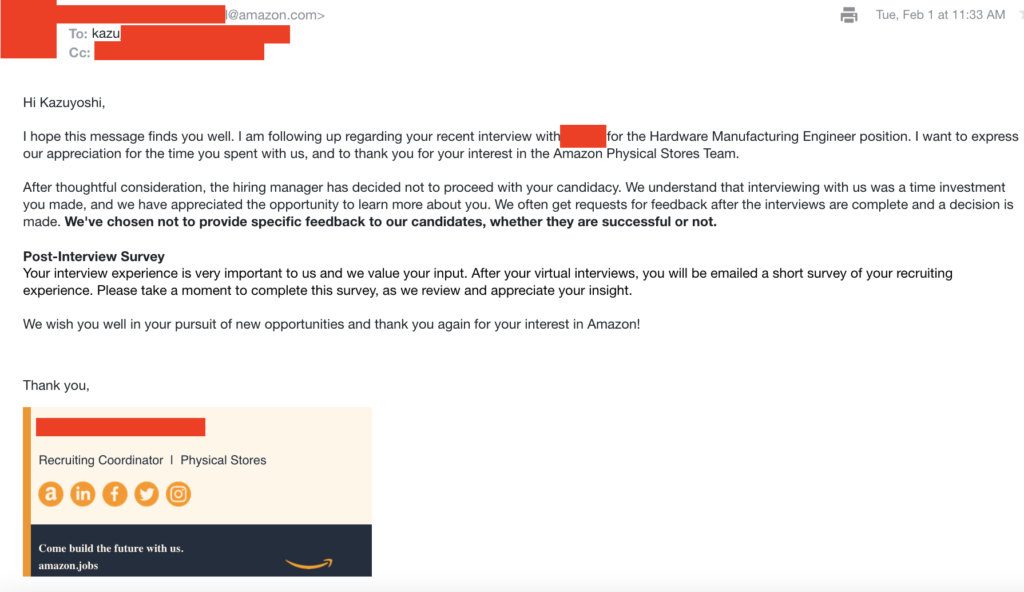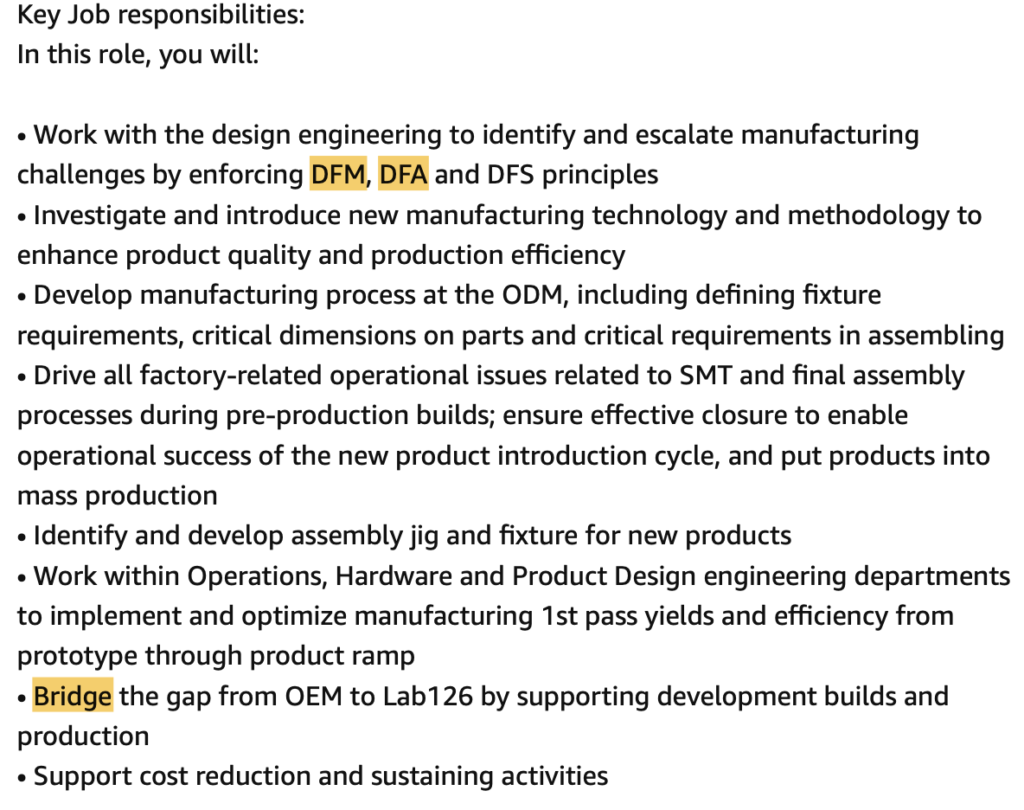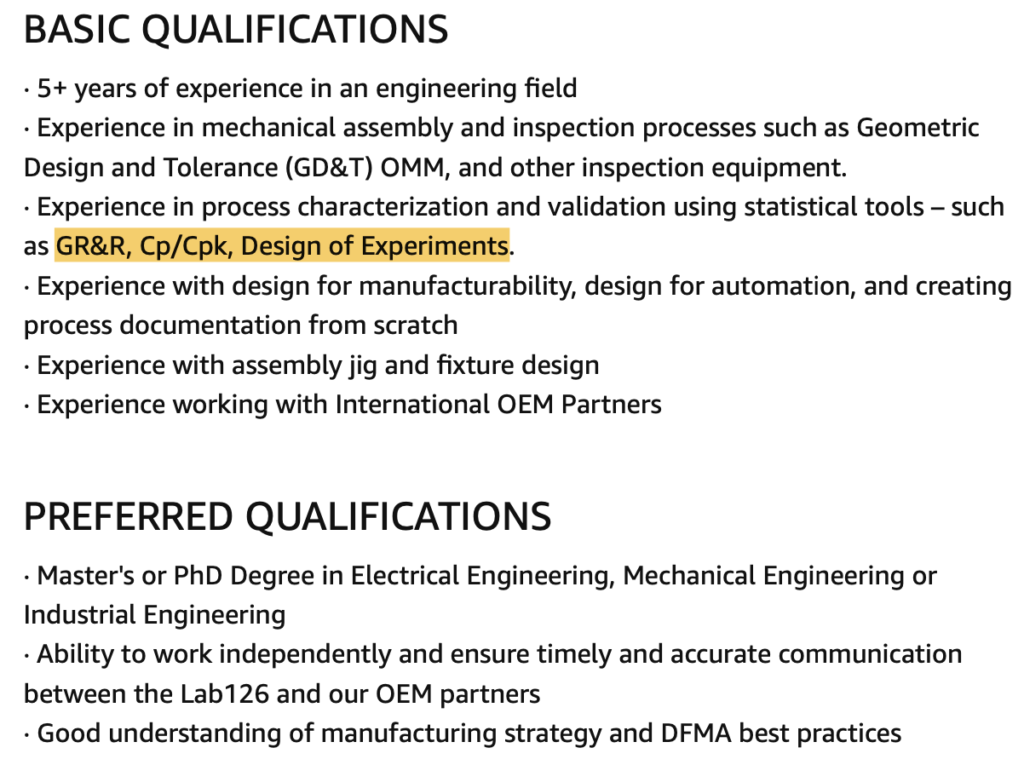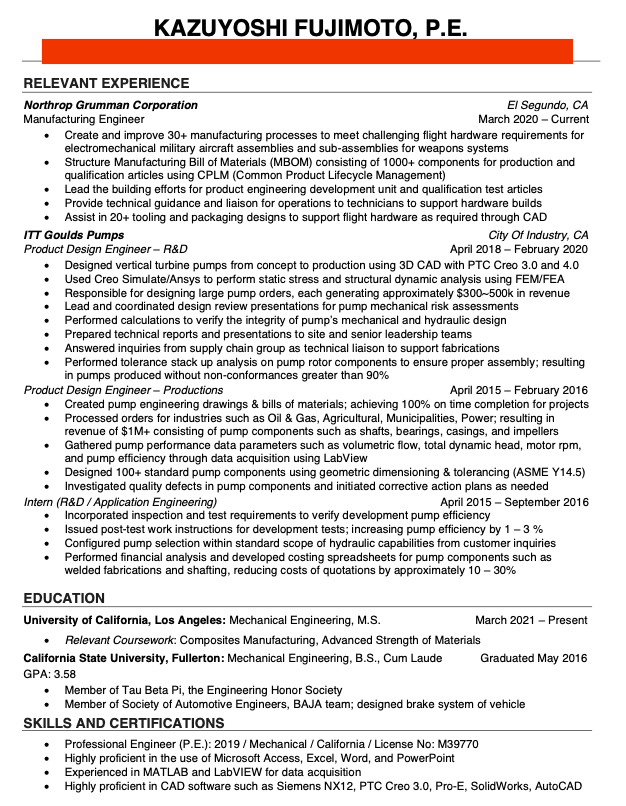So I had an amazon technical phone screen a few weeks ago. Apologize that this update is late, but I didn’t get the job. Overall, the interview was a good experience, but it was challenging. On the bright side, I have a better grasp of what an amazon technical phone screen is like, and am that much more closer to cracking the code to get into FAANG as a mechanical engineer. I also know how to write killer resumes.

It’s important, that when you apply for jobs, you review the job description and highlight your resume to show your skillsets and accomplishments.
Amazon Manufacturing Engineer Job Responsibilities

Amazon Manufacturing Engineer Job Qualifications
Anyone who has been a mechanical engineer for 5 years can fit the below job description.

The Resume That Got Me The Amazon Technical Phone Screen

Questions They Asked
Tell me about yourself
I always ask this in my mock interview sessions for this exact reason. Interviewers will ALWAYS ask to tell them about yourself. For this reason, you need to have an elevator pitch lined up and memorized.
My answer was something like the following:
“Growing up, I always enjoyed math and science and realized that I wanted to utilize those disciplines in my career, so I studied Mechanical Engineering. After I graduated mechanical engineering, I started working in Oil & Gas designing vertical turbine pumps. A few years later, I decided to switch gears and am currently a Manufacturing Engineer in the Defense Industry. As a manufacturing engineer, I am responsible for creating build plans (SOPs), tooling, packaging, and essentially acting as a bridge between design engineering and a finished produced component.”
Tell me about your undergraduate and master’s studies.
I was pretty thrown off by this question, but answered in a manner that simply described the courses that I took regarding a mechanical engineering curriculum.
Tell me about a technical challenge you had.
This was where I had an opportunity to utilize the STAR method and implement the leadership principles amazon had.
Walk me through one of those assemblies/sub-assemblies you have built.
I was asked to explain how a simple and complex sub-assembly was built from start to finish.
Walk me through your decision making framework to create SOPs.
At a high level company such as Amazon, be ready for framework type of questions. Also, as a general tip, frameworks ensure that things are done right and certain inputs are taken into consideration. I answered this question regarding my thought process of operating conditions and basically everything that a design touches. Examples that I bring up are – operating forces, temperatures, critical dimensions, customers, usage, and so on.
I actually was not ready for this question, but was able to quickly come up with something on the fly.
How do you determine process repeatability and reproducibility?
This was the one that threw me off, and that I wasn’t able to answer in a way that the interviewer wanted. I knew, judging from the job description, that I would be questioned on GR&R (Gage Repeatability & Reproducibility), Cp/cpk, and design of experiments, but wasn’t prepared for it. (Big mistake)
Even though my background does not include that skillset, had I looked up those topics, tied my experience to how those skillsets relate, came up with a good answer, I might have made it to the next round. I had to learn this the hard way, but I’m only that much more ready for the next one.
Do you have any questions for us?
Asked typical questions about how the work is, what the culture is like, opportunities for growth – basic questions that you should be asking in a job interview.
How I Should’ve Prepared
Take the technical phone screen to heart and not focus on as many behavioral type of questions. Everywhere I looked up stated that Amazon was big on their behavioral questions. Should’ve made sure I had the technical part down. I knew that there were certain skillsets that I hadn’t come across in my career such as GR&R (gage repeatability and reproducibility) and statistical analysis.
Feedback
Although Amazon does not provide feedback on interviews, I did ask a question, and the interviewer responded with “That’s a very smart question”
Me – “Is there anything I said or didn’t say that hurt my chances of getting the job, and if so, how can I address it?”
Interviewer – “That’s a very smart question”
I learned to ask this from a seminar in college. Funny to think that I actually got something from one of those seminars. I always thought those seminars whenever a guest speaker would arrive was a waste of time, but I got something useful out of it. It’s a very powerful question to ask in an interview, and can save you. The interviewer was impressed I asked this question and let me know that I wasn’t answering my questions in the they wanted me to answer. She gave me another chance to answer questions pertaining to repeatability and reproducibility, but it didn’t work out. I got rejected the same day as I interviewed.
Unfortunate that I didn’t get the job, but I did learn a lot, and am that much more ready for the next one.
About the author

Kazuyoshi Fujimoto, PE
Founder | Engineering Career Coach | Principal Mechanical Engineer
Kazu oversees all of ultmeche’s engineering services. He provides consulting such as resume reviews, rewrites, mock interviews, and all services career related. Additionally, Kazu performs consulting work regarding Oil & Gas, Automotive, and Aerospace & Defense. Kazu is licensed as a professional engineer in the state of California and has 9+ years of experience in Oil & Gas, Automotive, and Aerospace & Defense.
